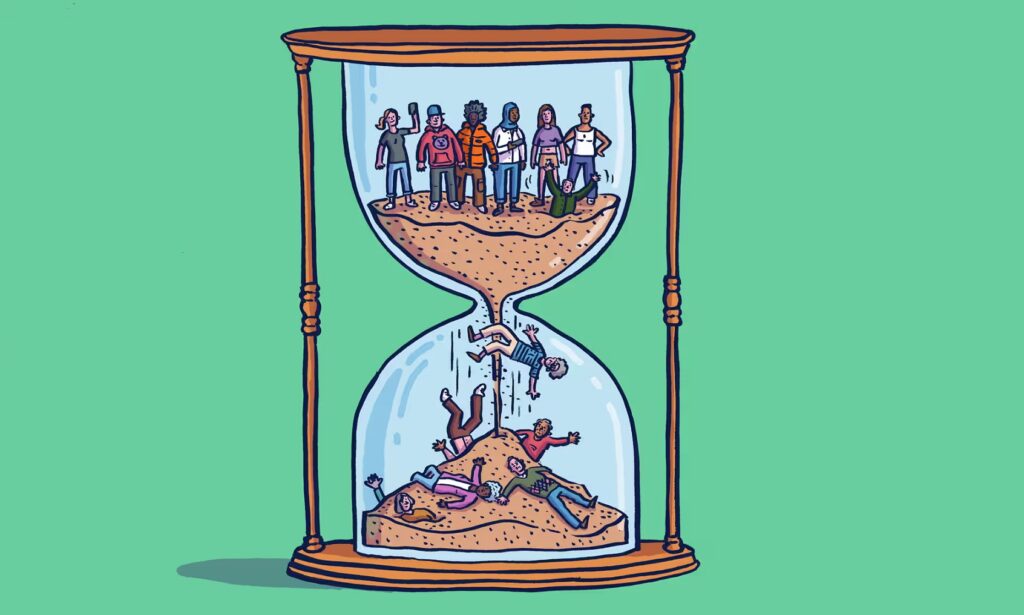FOGO, our fear of growing old, is sweeping the land. Just look at Trinny Woodall
Why do we discriminate against older people when none of us is getting any younger?
By Martha Gill
On September 16, 2023

Ageism is perhaps the most paradoxical prejudice: we are, barring accident, discriminating against ourselves. Members of the persecuting in-group are through the course of their lives gently conveyor-belted into the persecuted out-group, which is, when you think about it, a very strange state of affairs. If the rich inevitably became poor at a certain life stage, you might expect society to fill with vigorous socialists. But ageism persists. Why?
The best explanation perhaps is that it comes down to a sort of mass delusion on the part of the young. John Steinbeck wrote of America’s “temporarily embarrassed millionaires”, the poor who resist measures to hand them money because they believe one day they will be rich. When it comes to ageing, the fallacy runs in the other direction: the lucky believe their luck will never end. “One day that will be us struggling with newfangled technology,” the young say, as a joke, not really thinking it will be. “I’ll need that Zimmer frame one day,” they say, thinking they won’t.
The old are not discriminated against in every respect. In Britain, we hand over an increasing proportion of our resources to support them. A row over whether to keep the triple lock on state pensions rages in Westminster but doesn’t inspire much fury beyond it. Young people largely support the triple lock; the state pension is, after all, what keeps some of their grandparents out of poverty. (The yawning inequality between boomers and younger generations mainly concerns housing wealth, not the state pension.) And young people may reasonably fear that tampering with the state pension now could set an unfortunate precedent for their own retirement. The triple lock will finally be broken, the joke goes, when the first millennial reaches pension age.
Perceptions that pain, fatigue and depression are just ‘normal’ parts of ageing run rife
This makes psychological sense. What’s odd is that, while we support the old financially, we continue to discriminate against them in other ways. It’s a benevolent prejudice, of sorts – we view the old as deserving of protection, but not respect. Some of these ways are “merely” social. Reports find older people to be widely mocked and patronised by the rest of society. The young tend to view them as rather homogenous – a grey blur rather than a group of individual personalities, even though they must recognise, even from their own limited experience, that we tend to grow less similar as we grow older.
Meanwhile, TV dismisses the group that is most likely to watch it, even in programmes supposedly geared, often with great fanfare, towards older crowds. A new show about middle-aged dating is called – wait for it – My Mum, Your Dad, and insists on framing the couples in question through the eyes of their watching children, who are in their more-relatable teens and early 20s. The population is all the while slathered with ads for anti-ageing products – a recent book by Trinny Woodall recommends microneedling and gua sha, an ancient Chinese healing technique that stimulates lymphatic drainage with jade crystals. Billionaires with the dosh to give full rein to their anxieties run, undignified, the wrong way up the conveyor belt. Much attention has been given to the tech entrepreneur Bryan Johnson, who in an effort to defy the reaper swallows up to 100 pills a day, bathes his body in LED light, and has even put his son to use as a “blood boy”, injecting his blood plasma.
You’d be right, though, to fear becoming old. Discrimination against that group reaches even into healthcare, where it is dangerous. Assumptions about diminished “quality of life” can make doctors reluctant to suggest riskier interventions that could improve function or even extend lives. And perceptions that pain, fatigue and depression are just “normal” parts of ageing also run rife. Elsewhere, too, there is elder abuse. Surveys suggest one in five of us have either experienced abuse as an older person or know someone who has.
Plenty of older people want to work. But they are less likely to be shortlisted for interview, hired or promoted
But ageism costs all of us, and not just in the future. Economists fret over a “silver tsunami” set to smother the working population, but we hear less about the large “longevity dividend” available should companies adapt to older workers. Approximately 1 million older adults between the ages of 55 and 64 find themselves unwillingly unemployed; one report predicted helping them back to work would boost the economy by 1.3% by 2040. And it is prejudice that stands in the way. Plenty of older people want to work. But they are less likely to be shortlisted for interview, hired, promoted or given training opportunities, and they languish longer in unemployment when they lose work. This is probably the result of workplace stereotyping: they suffer from perceptions that they are less trainable, resistant to change and have limited technological capacity. “Ageist companies” are behind the current wave of early retirement, a new report finds.
he economy suffers from ageism in other ways: businesses are reluctant to target older people, preferring their customers to be young. One report calculated high street stores are losing £3.8bn a year merely because they fail to provide elderly people with places to sit. Removing barriers to spending would add 2% a year to GDP by 2040.
Tackling this prejudice is urgent. After all, the more elderly people are discriminated against, the more reason the young have to pretend they will never join them.
This piece was republished from The Guardian.